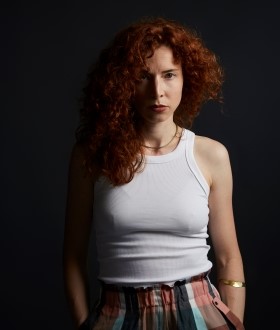Werner Düttmann Fellowship 2023

Vita
Sophie Seita is an artist and researcher whose work swims in the muddy waters of language, and explores materiality, gesture, and the speculative potential of the archive. She performs internationally and shows work across multiple media, publishes books, makes textiles and graphic scores, leads experimental workshops around voice, touch, translation, and queer performance, and is a Lecturer in the Art Department at Goldsmiths. Recent and current projects include: an exhibition at Mimosa House (London), performances and events at Nottingham Contemporary, Café Oto (London), the Royal College of Art, La MaMa Galleria (NYC), UP Projects, and community engagement projects at Grand Union (Birmingham), Creative Darlington, Curious Arts (Newcastle), and Ruta del Castor (Mexico City). She’s received grants and awards from Arts Council England, the Canada Council, British Council, DAAD, Studienstiftung des deutschen Volkes, Creative Scotland, amongst others. Her latest book is Lessons of Decal (87 Press, 2023).
Residency
How do we tussle with (in)direct communication and emotional expression, with clarity and opacity; what form do we give to a feeling that’s both gestural and embodied, but also abstract and conceptual? This project will create a new body of work around graphic scores, textiles, and queer performance. The scores will be created through a series of graphite and charcoal drawings and then screen-printed onto floor-length fabric curtains. I will then work with musicians to record them as sound pieces. These ‘talking textiles,’ as I’ve provisionally called them, will depart from expansive dialogues with other queer artists and local communities in the UK and Germany. Given their experimental nature, inspired by asemic writing and mid-century graphic music notation, my own scores remain unfixed and open to interpretation. The final outcome will be an exhibition of all of the ‘talking textiles’ inside a fabric-and-sound installation. At the end of the fellowship, I hope to invite my collaborators and members of the public to a collective performance of the textile scores through sound, BSL/GSL, and movement. What unites all of the individual elements of this project is an interest in the potential of language, its formation and deformation, its claim or resistance to making sense, its pleasures and calls to action. Committed to curiosity, not-knowing, and surprise, this project practises and invites close attention, queer intimacy, care, and openness.